Phoresis Read online
Page 9
8
“Maybe the other farmers are having more luck,” Frida suggested. “If they’ve found better soil, or found some trick that we’ve missed to deal with the tanglers, they could be thriving already, while we’re just wasting our time.”
Rosalind looked around the tent. The last time the same idea had been raised, people had still been clinging to their pride: every group was meant to be self-sufficient, capable of creating their own foothold in the new world. But now she sensed that most of her colleagues were so despondent that they’d be willing to seek help anywhere.
“The soil itself is perfectly fine,” Hildur insisted. “The seeds all germinate, before they’re choked by the tanglers. If we could just transport enough soil away from the plateau, and set up a new, pristine field out on the ice, the crops could grow there, unmolested.”
“And what’s supposed to hold the soil in place, while we’re waiting for the seedlings to spread their own roots?” Frida asked.
“We carve trenches into the ice,” Hildur replied. “Deep enough to trap the soil, to shelter it from the wind. But once the crops become established, we can start smashing the walls between the trenches, one by one, until we end up with a continuous field.”
Rosalind couldn’t decide which part of this plan would take the most work: hacking up the ice to make the trenches, or filling them with soil when every handful had to be wrestled out from between the tanglers.
Anya said, “I think it’s time to try everything. My vote would be to send a couple of people to tour all the other soil deposits in the region; there might be something we can learn from every one of them, whether or not there are people trying to farm them. But we should also start work on testing Hildur’s idea.”
Joanna said, “And what about my idea?”
Anya scowled. “If it kills you, we lose you and your brothers—”
“If it kills me, no one else needs to waste their time wondering about it.” Joanna laughed softly. “I could easily have died in my glider—revealing nothing new or interesting about this world—and no one would have treated that as a calamity!”
Rosalind said, “When you ate the berries that the cats eat, you were sick for four days.”
“That was worth knowing, wasn’t it?”
“Only if you learn not to take the same risk again!”
Joanna sighed. “It wouldn’t be the same. The tanglers want the cats to eat those berries, for whatever reason. They’ve made them nutritious for that particular animal, and they must get some kind of benefit in return. Maybe the cats travel far enough to excrete the seeds in places where the plant couldn’t send them by any other means. But the cats don’t eat the roots; nothing we’ve seen does that. And maybe if the parts the locals relish make us sick, the parts they avoid will have the opposite effect.”
“There’s no logic in that,” Sigrid protested.
“I didn’t claim it was a syllogism,” Joanna replied. “But it’s still a possibility, until someone tests it.”
Anya said, “Let’s have a break to think things over before the vote.”
Rosalind was glad to get out of the tent; just standing beneath Tvíbura reminded her of how many supposedly impossible problems their predecessors had managed to solve. They could not come this far and fail. There was fertile soil all around her; all they needed to do was prize enough of it out of the tanglers’ grasp. Hildur’s proposal was daunting, but none of them were afraid of hard work. Rosalind tried to picture the expression on her mother’s face when she saw the first farms rising up, not on the original soil deposits that had been mapped generations ago, but on their borders.
Joanna approached. “Are you going to vote for my plan?”
Rosalind laughed, exasperated. “What plan? I can still smell the vomit from when you tried the berries. What was your argument then? ‘Look at how strong and healthy the cats are!’”
“It’ll be a risk,” Joanna admitted, “but it’d hardly be the biggest one we’ve taken. And it won’t be easy to poison myself; those roots are tough. It’ll take half a day to slice them up, and the rest to chew the pieces.”
“Which is why we need to keep trying to grow actual food,” Rosalind replied.
Joanna said, “None of these proposals are mutually exclusive. And believe me, I’d prefer to eat something that grows back home—though with turnips, honestly, would there be any difference? But we need to know exactly what we can and can’t eat here, even if it’s just a matter of having something to fall back on if there’s a shortage of our own crops in the future.”
Rosalind had no problem with planning for contingencies. It was the idea of making do with the tanglers that dismayed her.
“If we can’t grow our own crops,” she said, “how will anyone know that we survived? How will they know that it’s safe to follow us?”
Joanna nodded grimly. “If the famine doesn’t break, there’ll be nothing more important than letting people know whether or not they can escape it here. But if we can find a way to feed ourselves without covering the soil with our own kind of crops, we’ll just have to find another way to get a signal across the void.”
Anya called them back in for the vote. In the end, everyone agreed to send emissaries in search of the other expeditions, and the vote was five-to-three in favor of testing Hildur’s back-breaking plan.
But only Joanna voted for a trial of the tangler roots’ culinary potential. Rosalind had tried to be objective about it, but she couldn’t. She did not want to learn that there was a way to keep on living while everyone they’d left behind starved to death.
As sunset approached and the other members of the team put down their picks and headed for the tent, Rosalind decided to keep working. She had almost come to the end of her second trench, and she wanted the satisfaction of finishing it before she slept.
Her shoulders ached, and she was famished, but each time she swung the pick, the spray of blue-white chips flying off the ice-face was all she needed as proof that she was making progress. This was how they’d finish the task: one strike at a time, over and over, until it was done. Tvíburi had made the job harder than it had to be, in ways she’d never expected, but their patience would wear the world down. Tvíburi would feed them, willing or not.
Her brothers squirmed and hissed, disturbed by her labors, but she knew they wouldn’t grow any calmer when she stopped to rest. They’d woken from their long sleep more ardent than ever, and though she could hardly blame them for the expedition running out of pessaries, they ought to have been capable of noticing how poorly fed everyone was. Who tried to bring children into a world without crops?
“Rosalind? Is that you?”
Rosalind looked up to see a lone figure approaching across the ice. In the twilight, she couldn’t make out the woman’s face, but she knew the voices of her seven fellow villagers, and this wasn’t one of them.
She put down her pick. “Your eyesight’s better than mine,” she called back.
The woman laughed, and strode forward to meet her.
“Erin?”
“Your eyes are still working.” Erin removed her pack and they embraced.
“How’s your group?” Rosalind asked. “Did everyone land safely?”
Erin looked down. “We lost Miranda.”
“I’m sorry.” Rosalind hadn’t know Miranda well, and she decided not to reopen the wound with more questions.
“And yours?”
“We were lucky. Everyone survived.”
Erin turned and surveyed the trenches. “I see you’re trying the same thing as we did.”
“You’ve done this too?”
“Yes.” Erin hesitated, then added, “I should probably tell you about our experience.”
“You’d be welcome to.” Rosalind gestured toward the tent. “Come and rest, first. How long since you’ve eaten?” Erin looked remarkably healthy for someone who’d been walking for days, but it would still be impolite not to share what they had with her.
Rosalind was startled. “You’re eating tanglers?”
“That’s not what we called them, but yes. Just the roots. You do know the nodules are no good?”
She had to mean what Joanna had called berries, though they sprung from the tanglers’ roots, and could only be plucked easily from the walls of an animal’s burrow. Rosalind said, “That was made very clear.”
Erin poked a finger into her mouth and dislodged the mass from around her teeth, shifting it to the other side.
“What else is your group eating?” Rosalind asked. The roots seemed to take so much effort to masticate that it was hard to believe the process didn’t consume more energy than it yielded.
“Parts of the voles. The cats are too hard to catch. I know, the voles eat the nodules too, and some of their organs seem to concentrate the unpleasantness, but most of their flesh is fine.”
Rosalind had more questions, but she led her guest toward the tent. “Frida and Joanna are off on a tour of their own,” she said. “They might even have stumbled on your people by now.”
“I have a map with all the villages on it,” Erin replied. “Or I will have, once I add this place. So if you tell me which way they were going, I can tell you who they will have met first.”
They entered the tent, and everyone embraced Erin. She refused all their offers of food, and the seven of them sat down in a ring on the blankets. They had no fuel for the lamps anymore, but there was enough light from Tvíbura to let them see each other’s faces.
Once the pleasantries were out of the way, people started quizzing Erin about her village’s agricultural experiments.
“We tried putting soil in furrows in the ice,” she explained. “The first time, we did it close to the plateau, as you’ve done—to make the transport easier. But within six or seven days, there were…I think you call them ‘tanglers’…growing in all the furrows. We assumed that the seeds must have blown in on the wind.”
So much for our own efforts, Rosalind thought. But at least they’d now be spared wasting any more time on a flawed method. And she could feel the tension growing as people waited to hear about the next step: the one that actually worked.
“We repeated the whole thing much farther away,” Erin continued. “We had guards watching, day and night, to shoo the cats away, in case they came and shat seeds into our precious soil. But the same thing happened. The tanglers appeared, just as quickly as before, and nothing of our own could grow.”
“How is that possible?” Hildur protested. “Even if the wind is blowing the seeds far and wide, how could there be as many of them at a greater distance?”
“We must have brought them there ourselves,” Erin replied. “The soil must be full of them, and they’re either too small to discern, or too similar to the particles of soil to be picked out by inspection. Whatever the cats are spreading, it can’t be the only means these things have of reproducing. We’ve tried washing the soil, sieving it through fabric, tossing it in the air and only using the parts that fall at different distances—hoping the wind will separate out the seeds and leave us with something we can use. But so far, whatever we do, we either end up with useless gray dust in which nothing at all will grow…or we end up with rich, brown soil full of tanglers.”
9
Rosalind couldn’t sleep, so she left the tent and walked out across the ice. It was close to midnight, with Tvíbura almost entirely in shadow.
She paced the encampment, repeating the calculations that had kept her awake, hoping she might have made an error that she could detect now that she was fully alert. But the results remained the same. Even if the people of all six villages devoted every waking moment to digging trenches in the ice and filling them with soil, it would take at least three generations to spell out an unambiguous message in letters large enough to be read through a telescope.
Maybe a written message wasn’t necessary; any clearly artificial structure would demonstrate that the colonists were still alive. In the absence of recognizable farmland, that would still prove that there was a source of food here. But would anyone actually make the crossing from Tvíbura on no other evidence than a few baffling lines appearing in the ice? If they were desperate, if they were starving, maybe a handful of people would interpret the peculiar artefacts as signs of hope; maybe there would even be enough of them to support each other in all the tasks they’d need to perform to make the crossing safely. But it was hard to imagine an influx so great that it became self-sustaining, with the new arrivals so numerous as to add significantly to the artefacts’ drawing power. Most people would need a clear promise that a better life awaited them on Tvíburi—and most people would find that unimaginable in the absence of the kind of plants they were accustomed to eating.
She heard a rustle of fabric, and turned to see Joanna emerging from the tent.
“Are you thinking what I’m thinking?” Joanna asked.
“Possibly, but tell me anyway.”
“We need to do something with the root cuttings.”
Rosalind took a moment to understand her meaning; most of the talk about “roots” that she’d heard lately had concerned the tanglers.
“Do what with them?” They’d brought the Yggdrasil cuttings with them on the chance that, if there was a local variety that lacked some of the qualities needed to grow a second tower, the two kinds might be spliced together. The idea itself wasn’t entirely fanciful; farmers had sometimes succeeded with heterogeneous grafts for other kinds of plants. But there was no sign of any local version of the Yggdrasils at all.
Joanna said, “Drop them in a hole that takes them all the way down to the ocean.”
“Into a geyser?” Rosalind was bemused. “Even assuming that they find the conditions amenable down there—with no competitors as brutal for them as the tanglers are for the crops—how long do you imagine it would take for the tree to get its roots up to the surface?”
“I don’t know,” Joanna confessed. “Generations, for sure. But that’s no reason to put it off. If we don’t do everything in our power to make it possible to get word back to Tvíbura, people are going to go mad. It’s hard enough accepting that there’s probably no way to achieve that in our lifetimes, but at least we have the tradition of the tower-builders to fall back on: if they could work for something that they knew they wouldn’t live to see for themselves, we can do the same. It won’t be enough to make anyone content, but it might be enough to keep us from losing hope.”
Rosalind couldn’t find much comfort in this definition of hope: some small chance of the cuttings thriving in the ocean; generations for the roots to break the surface, then generations more for a second tower to be grown. She wanted her friends to join her before she died. She wanted her mother to live long enough to know that the expedition had succeeded.
But she had no idea how to make those things happen.
“We don’t seem to have any other use for the cuttings,” she conceded, “and if half the villages keep theirs, just in case, I can’t see any harm in trying.”
“So you’ll vote with me on this?”
“Yes.” Rosalind stopped to ponder the practicalities. “Which geyser are we talking about?”
“The closest one to the closest point to Tvíbura,” Joanna replied. “I don’t care how far I have to walk, but if the Yggdrasil is to be of any use for tower-building, we need the roots to emerge in the right position.”
“The terrain around there looked a bit tricky.” Rosalind had found the strangely sculpted ice deposits quite beautiful when she’d been gazing down at them through the telescope, but she’d never contemplated trying to scramble over them.
Joanna didn’t dispute this assessment. “So if you’re coming with me,” she said, “don’t forget to pack plenty of rope.”
The geyser rose highest around midnight and noon, dying away completely by sunset and dawn.
Rosalind watched the white column ascend every morning, wondering if the glimmering haze contained a few droplets of water, or if the spray bursting out from the buried ocean froze entirely into powdered ice by the time it reached the surface. It was strange to think that the same eruptions had once been so common on Tvíbura that everyone in the world would have seen at least two or three in their lifetime, and many would have witnessed them up close. The marvel she was approaching had been entirely commonplace.
In the evenings, they often saw cats out on the ice, and by day, lizards overhead. No animal here was quite the same as anything back home, but they seemed too close to Tvíburan species to have no kinship with them at all. With plants it was another story, but perhaps the tanglers were the oldest, purest Tvíburians, and they’d conquered their territory long before any Tvíburan seed tried to gain a foothold. Rosalind could not imagine a cat being flung from world to world by any means and ending up alive, but if ancient lizards had flown in the skies of Tvíbura when its own air was thicker, it was not inconceivable that they could have survived the crossing.
By the fourth day of their journey, the geyser was beginning to resemble an ephemeral version of the tower: a white streak bisecting the horizon and stretching toward the zenith, tapering to invisibility long before it actually came to an end. There was a faint, low rumble in the ice that presaged its appearance, catching Rosalind’s attention just in time for her to follow the top of the fountain as it rushed into the sky.
Though the column of ice-dust came and went, it rose from a permanent base. It was hard to discern when the geyser was flowing, but in the late afternoon, when the sun had moved on to squeeze the ocean out through other vents, a low, broad cone of ridged and jagged ice emerged from the haze.

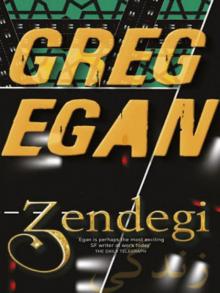 Zendegi
Zendegi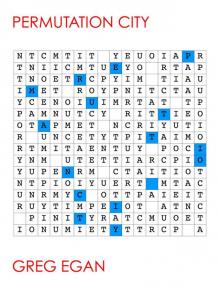 Permutation City
Permutation City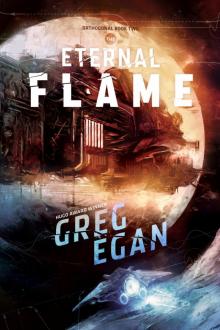 The Eternal Flame
The Eternal Flame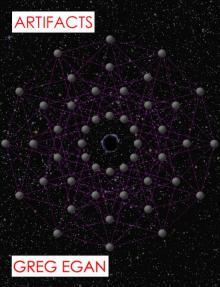 Artifacts
Artifacts Wang's Carpets
Wang's Carpets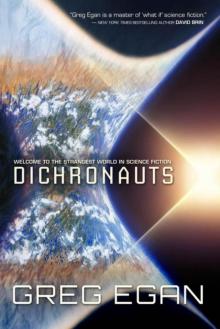 Dichronauts
Dichronauts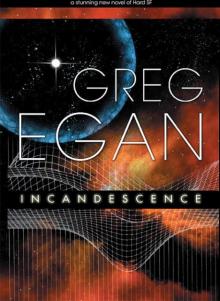 Incandescence
Incandescence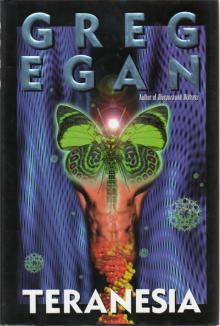 Teranesia
Teranesia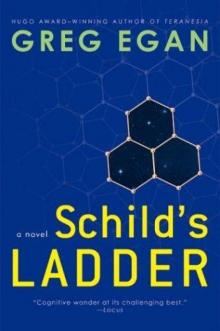 Schild's Ladder
Schild's Ladder Quarantine
Quarantine The Four Thousand, the Eight Hundred
The Four Thousand, the Eight Hundred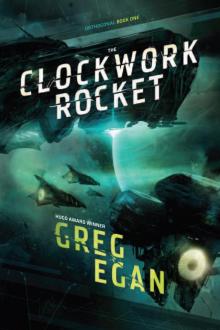 The Clockwork Rocket
The Clockwork Rocket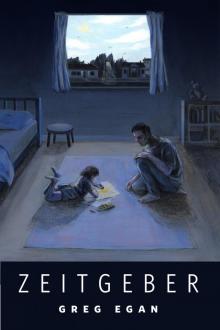 Zeitgeber
Zeitgeber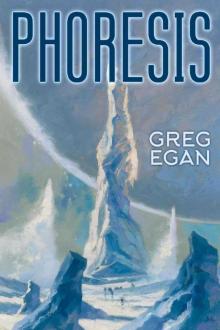 Phoresis
Phoresis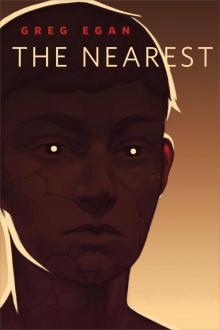 The Nearest
The Nearest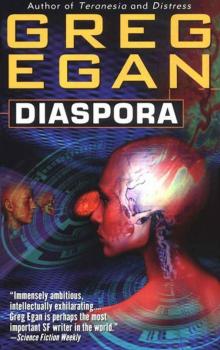 Diaspora
Diaspora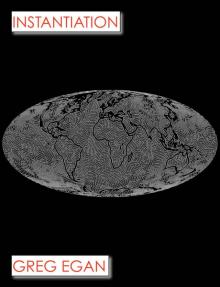 Instantiation
Instantiation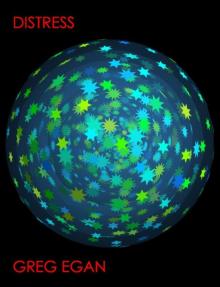 Distress
Distress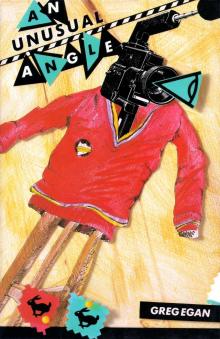 An Unusual Angle
An Unusual Angle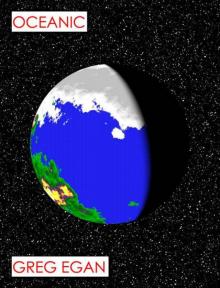 Oceanic
Oceanic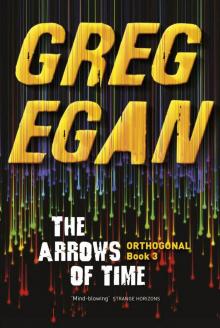 The Arrows of Time
The Arrows of Time Axiomatic
Axiomatic![Anthology 2. Luminous [1998, 2010] Read online](http://i1.bookreadfree.com/i/03/18/anthology_2_luminous_1998_2010_preview.jpg) Anthology 2. Luminous [1998, 2010]
Anthology 2. Luminous [1998, 2010]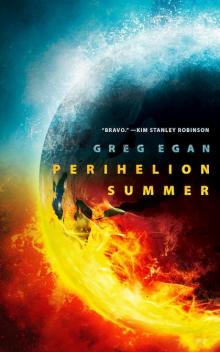 Perihelion Summer
Perihelion Summer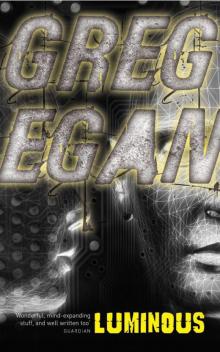 Luminous
Luminous